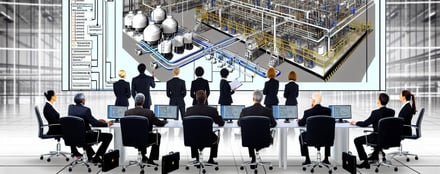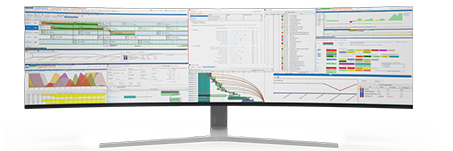AI-assisted Constraint-Based Scheduling
As an Operations Director, you're no stranger to the complexities involved in scheduling production runs efficiently while balancing constraints such as limited resources, varying demand, and stringent regulatory requirements. However, with the advent of Artificial Intelligence (AI) and advanced scheduling techniques, a new era of optimization is dawning upon us.
In this blog, we look into the realm of AI-assisted Constraint-Based Scheduling (CBS) and its pivotal role in revolutionizing the way chemical manufacturing facilities operate. Specifically, we explore the integration between PlanetTogether, a leading CBS software, and industry giants such as SAP, Oracle, Microsoft, Kinaxis, and Aveva, to unlock unparalleled efficiency gains.

Constraint-Based Scheduling
At the heart of efficient production scheduling lies Constraint-Based Scheduling. Unlike traditional methods that focus solely on maximizing throughput, CBS takes into account various constraints, including machine capacities, material availability, and workforce limitations, to create feasible production schedules.
With CBS, each step in the production process is treated as a constraint, and the scheduling algorithm works to optimize the sequence of operations while respecting these constraints. This approach minimizes bottlenecks, reduces idle time, and ensures optimal resource utilization, ultimately leading to improved productivity and cost savings.

The Role of AI in Constraint-Based Scheduling
While CBS is a powerful tool on its own, its capabilities are further enhanced with the integration of AI technologies. AI brings predictive analytics, machine learning, and optimization algorithms to the table, enabling smarter decision-making and adaptive scheduling in real-time.
AI-powered CBS systems can analyze vast amounts of data, predict potential disruptions, and recommend optimal schedules based on current conditions. Moreover, they continuously learn from past performance, refining their algorithms to adapt to changing dynamics and improve scheduling accuracy over time.


Integration with Enterprise Resource Planning (ERP) Systems
For seamless operations in chemical manufacturing facilities, integration between CBS software and ERP systems is essential. ERP systems such as SAP, Oracle, Microsoft Dynamics, Kinaxis, and Aveva provide comprehensive data on inventory levels, customer orders, and production capacities, which are crucial inputs for scheduling.
By integrating PlanetTogether with these ERP systems, Operations Directors gain a holistic view of their manufacturing operations, from raw material procurement to final product delivery. Real-time data synchronization ensures that scheduling decisions are based on the latest information, minimizing the risk of disruptions and maximizing efficiency.
Benefits of Integration
The integration between PlanetTogether and leading ERP systems offers a myriad of benefits for Operations Directors:
Enhanced Visibility: By centralizing data from ERP and scheduling systems, Operations Directors gain a holistic view of production processes, enabling better decision-making and proactive problem-solving.
Improved Efficiency: AI-assisted CBS optimizes production schedules in real-time, taking into account resource constraints and demand fluctuations, leading to increased throughput and reduced lead times.
Cost Savings: By minimizing idle time, reducing overtime, and optimizing resource utilization, integrated scheduling solutions help lower operational costs and improve profitability.
Regulatory Compliance: With accurate scheduling and traceability features, chemical manufacturers can ensure compliance with regulatory standards, mitigating the risk of fines or penalties.
AI-assisted Constraint-Based Scheduling represents a game-changer for chemical manufacturing facilities striving to optimize their operations. By integrating advanced scheduling solutions like PlanetTogether with leading ERP systems such as SAP, Oracle, Microsoft Dynamics, Kinaxis, and Aveva, Operations Directors can unlock unprecedented efficiency gains, reduce costs, and stay ahead of the competition in an ever-evolving industry landscape.
As you navigate the complexities of chemical manufacturing, embrace the power of AI and integrated scheduling solutions to drive continuous improvement and sustainable growth.
Remember, the future of manufacturing is intelligent, adaptive, and optimized. Are you ready to take your manufacturing operations to the next level? Contact us today to learn more about how PlanetTogether can help you achieve your goals and drive success in your industry.























LEAVE A COMMENT